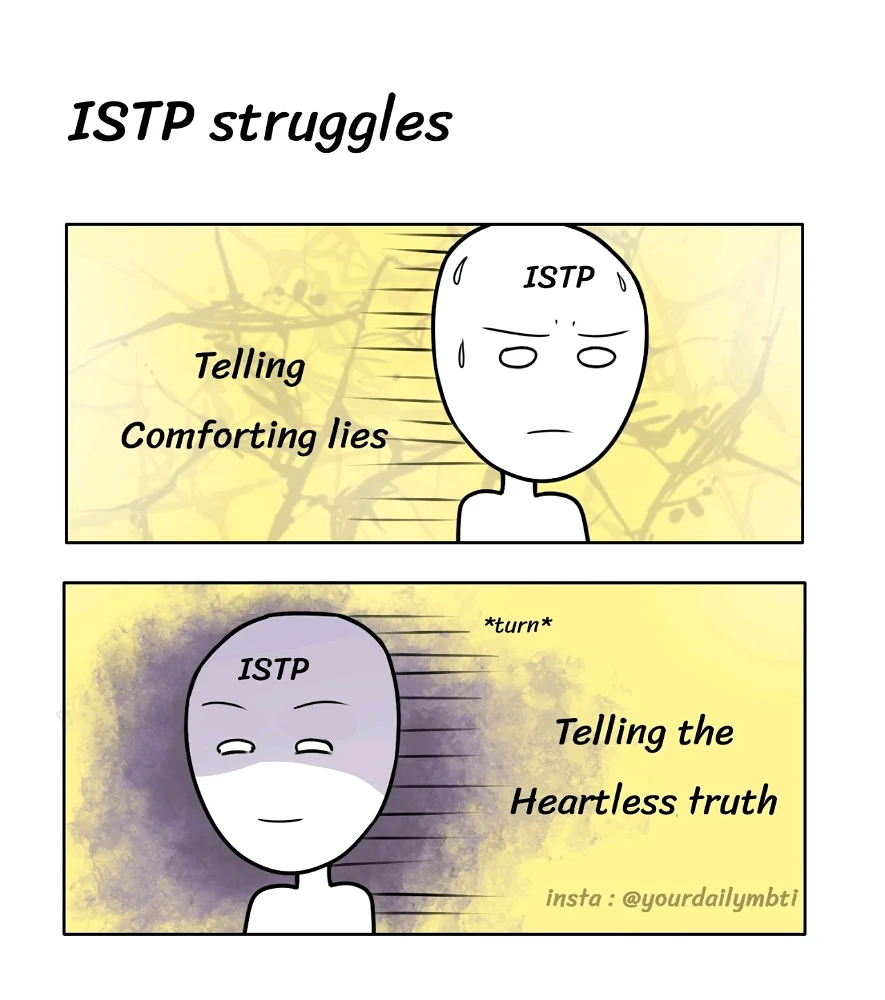We use cookies on our website for a number of purposes, including analytics, performance, and advertising. Learn more.
OK!
Boo
SIGN IN
Toxic Traits of an ISTP: Navigating the Artisan's Shadow Side
By Boo Last Updated: September 11, 2024
Look, we all have our ups and downs—traits we're proud of and others we'd rather not broadcast on social media. If you're an ISTP like me or you're orbiting one, you might've noticed a few quirks that don't exactly make the "Top 10 Desirable Qualities" list. Here, we're not just pointing fingers at these toxic traits; we're dissecting them. Understanding is the first step to change, right?
So, what's the plan? We're going to delve into the less-than-stellar characteristics that can manifest in an ISTP. We'll break down why these traits appear and toss in some practical advice on how to deal with them. No fluff, no filler—just actionable insights. Whether you're an ISTP aiming for self-improvement or someone grappling with an ISTP's complicated ways, we've got the lowdown for you.
Explore the ISTP Wellness Series
- Wellness for an ISTP
- 10 Things that Excite ISTP
- The Guide to ISTP Anger
- How ISTP Handle Stress
- Surprising Sexuality of ISTP
The ISTP Unveiled: Key Traits Unpacked
ISTPs are often seen as the 'quiet warriors' among us, people who get things done without making a big fuss about it. This makes them unique and admirable but not without their set of challenges. Here's a closer look at some of the defining ISTP traits:
- Independence: This isn't just about being a lone wolf. ISTPs value their freedom so much that it informs their decision-making. You’re not likely to find an ISTP who’ll blindly follow the crowd; they set their own rules.
- Problem-solving skills: ISTPs are like walking Swiss Army knives. They have a knack for looking at a situation and finding practical solutions. This isn't just mechanical; it can also apply to planning a good evening out or troubleshooting in relationships.
- Love for challenges: This one's more than just a preference for the difficult. An ISTP relishes complexity. When faced with a problem most would shy away from, the ISTP digs in with gusto.
- Adaptability: Ever try throwing an ISTP a curveball? They'll catch it and throw it back before you know it. This trait lets them excel in unfamiliar or dynamic situations.
- Hands-on approach: ISTPs aren't fans of endless talk without action. They need to see, touch, and feel the world around them, often gaining expertise through direct experience rather than studying theories.
ISTP Pitfalls: The Traits That Trip Us Up
Nobody's perfect, and that includes ISTPs. When certain cognitive functions like Introverted Thinking (Ti) and Extroverted Sensing (Se) are overemphasized, or others like Introverted Intuition (Ni) and Extroverted Feeling (Fe) are neglected, bad habits can form.
Emotional detachment
ISTPs rely heavily on their dominant function, Ti, coupled with their auxiliary function, Se. This combo is great for logical reasoning but can make them emotionally distant. For instance, imagine you're having a heated argument with your partner. Instead of validating their feelings, you might find yourself breaking down their emotional outburst into logical inconsistencies, causing more harm than good.
Overindulgence in sensory pleasures
The auxiliary function, Se, pushes ISTPs to seek out new experiences. But in a toxic state, this can escalate into reckless or addictive behavior. You might discover the thrill of skydiving and end up spending money you don't have, thereby neglecting other responsibilities in your life.
Disregard for long-term consequences
When Inferior Fe and Tertiary Ni aren't in sync, ISTPs may act without thinking of the future. An example of this would be spontaneously quitting your job because it felt like the right thing to do at the moment, only to find yourself in financial turmoil later on.
Lack of commitment
A toxic ISTP can be commitment-phobic due to an overreliance on freedom and new experiences. This could manifest as suddenly breaking up with a long-term partner, stating that you're "feeling trapped," even when there were ways to work things out.
Digging Deeper: The Origins of ISTP Toxicity
You might wonder why ISTPs develop these unflattering traits. No one wakes up and decides, "Hey, I'm going to be toxic today!" There are underlying reasons for this behavioral drift.
Unresolved personal issues
When you've got unresolved trauma or emotional baggage, it tends to manifest in various ways. For ISTPs who are naturally more reserved in expressing their emotions, these unresolved issues might manifest as impulsivity or emotional detachment. It's a kind of armor, a way to protect yourself from facing what's really bothering you. But the catch is that while you're avoiding your problems, you're also keeping at arm's length the people who might actually enrich your life. Recognize this pattern and seek appropriate channels—counseling, talking openly with trusted ones, etc.—to start untangling those emotional knots.
Coping mechanisms gone awry
ISTPs are known for their love of new experiences and skills. However, when life gets tough, this knack for newness can transform into escapism. What was once a fulfilling hobby can become a rabbit hole you throw yourself into, avoiding responsibilities and relationships. You might think you're "just blowing off steam," but it could turn into a lifestyle that's unsustainable and damaging. Awareness is key, so if you see a coping mechanism turning problematic, it might be time to reassess.
External pressures
Let's be real, society has its own set of expectations, and they don't always align with ISTP traits. The pressure to conform can be intense. For some ISTPs, this external pressure can turn into toxic traits as a form of rebellion or self-preservation. It's like you're saying, "You can't fit me into a box!" but in doing so, you may alienate yourself from opportunities and relationships that could be beneficial. The trick here is to find a balance, a way to be true to yourself without being defiant just for the sake of defiance.
Lack of emotional education
Not everyone grows up learning how to manage their emotions in a healthy way. ISTPs might find themselves especially challenged in this department because they naturally prioritize logic and facts. But lacking the tools to handle emotions doesn't make them go away; it usually makes things messier. This lack of emotional know-how can result in outbursts, emotional detachment, or misguided actions that hurt others. The good news? Emotional intelligence can be learned. It takes effort, sure, but the payoff is a more balanced, fulfilling life.
Turning the Tide: How ISTPs Can Tackle Toxic Traits
Change doesn't happen overnight. It requires consistent effort and a roadmap. Here's what you can do:
Self-awareness
You can't fix a problem you don't acknowledge. The first step in curbing toxic traits is gaining self-awareness. Reflect on your actions and how they affect those around you. This is where understanding your ISTP cognitive functions (Ti-Se-Ni-Fe) can come in handy. Recognize where your thinking and actions may go astray and be willing to do something about it.
Seek balance
We ISTPs tend to think we've got it all figured out, but an external perspective can be eye-opening. Ask for honest feedback from people you trust, whether they are friends, family, or partners. They can provide insights into how your behavior impacts them, and sometimes they'll notice things you're completely blind to.
Emotional tuning
Remember that bit about emotional neglect? Yeah, it's time to address that. ISTPs can be out of touch with their feelings, but tuning into your emotional side isn't betraying your logical nature; it's complementing it. Develop techniques to process your emotions constructively. Journaling, talking to a friend or a mental health professional, or even mindful meditation can be useful tools.
Social calibration
Avoiding people isn't a long-term strategy. You have to learn to play nice with the rest of the human race. Improve your social skills by stepping out of your comfort zone. Engage in social activities that force you to read emotional cues and adapt your behavior. It might be uncomfortable at first, but it's crucial for growth.
FAQs
How do I know if I'm a toxic ISTP?
Signs may include consistent negative feedback from those around you or finding that your relationships and professional life suffer due to your behavior.
Can a toxic ISTP change?
Yes, but it will take awareness, effort, and sometimes external guidance. Nobody is set in stone.
Do all ISTPs have toxic traits?
No, but everyone has the potential for toxic behaviors. Being aware helps in prevention.
Is emotional detachment always a bad thing?
No, but when it leads to ignoring or neglecting the emotional needs of others, it becomes a problem.
How can ISTPs improve emotional intelligence?
This could be through deliberate practice like active listening or even seeking professional help like counseling.
To Conclude: Turn the Page to a Better ISTP You
Understanding the ISTP personality—including the less savory aspects—is the first step in creating a better version of yourself or improving your relationship with an ISTP. It may be a long journey, but acknowledging the problem is already half the battle won. Good luck.
MEET NEW PEOPLE
JOIN NOW
30,000,000+ DOWNLOADS
ISTP People and Characters
Universes
Personalities
Personality Database
Meet New People
30,000,000+ DOWNLOADS
JOIN NOW






















































